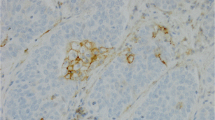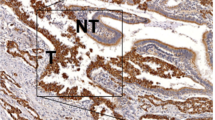Abstract
It is suggested that adrenomedullin (AM) plays a role in lung carcinogenesis although, to confirm this suggestion, further clinical studies are needed to determine its relationship with prognosis in lung cancer. Archived 50 paraffin-embedded tumor samples of the lung were retrospectively evaluated for AM expression by immunohistochemistry and analyzed for a possible correlation with patient characteristics and survival. Quantitation of immunoreactivity was accomplished using an immunohistochemical scoring system. The pulmonary resection specimens contained 22 squamous cell carcinomas, 15 adenocarcinomas, and 13 small cell carcinomas. Non-small cell carcinomas of the lung were more likely to express AM than small cell carcinomas of the lung. Ninety-one percent of squamous cell carcinomas and 87% of adenocarcinomas expressed AM at a moderate to strong level and grade2–4 (30-100%), which were significantly higher from the non-neo-plastic lung tissue. Twenty-three percent of small cell carcinomas of lung expressed AM. Interestingly, AM immunoreactivity was essentially weak and grade 1 (<%30) in this group. AM expression is upregulated in non-small cell carcinomas of the lung, whereas it is downregulated in small cell carcinomas and non-neo-plastic lung tissues. AM expression did not show any correlation with the differentiation of the tumor, the stage of cancer, and the overall survival of patients. These results did not support the role of adrenomedullin as an independent survival factor for lung cancer. However, AM inhibition in conjunction with other anti-angiogenic agents may be useful in the prevention and treatment of malignancies.
Similar content being viewed by others
References
Kitamura K., et al. Adrenomedullin: a novel hypotensive peptide isolated from human pheochromocytoma.Biochem Biophys Res Commun 1993;192:553–560.
Ishiyama Y., et al. Hemodynamic effects of a novel hypotensive peptide, human adrenomedullin in rats.Eur J Pharmacol 1993;241:271–273.
Kitamura K, Sakata J, Kangawa K, Kojima M, Matsuo H, Eto T: Cloning and characterization of cDNA encoding a precursor for adrenomedullin.Biochem Biophys Res Commun 1993;194:720–725.
Kato H, Shichiri M, Marumo F, Hirata Y. Adrenomedullin as an autocrine/paracrine apoptosis survival factor for rat endothelial cells.Endocrinology 1997;138:2615–2620.
Cormier-Regard S, Nguyen SV, Claycomb WC. Adreno-medullin gene expression is developmentally regulated and induced by hypoxia in rat ventricular cardiac myocytes.J BiolChem 1998;273:17787–17792.
Garayoa M, et al. Hypoxia-inducible factor-1 (HIF-1) upregulates adrenomedullin expression in human tumor cell lines during oxygen deprivation: a possible promotion mechanism of carcinogenesis.Mol Endocrinol 2000;41:848–862.
Iwasaki H, Eguchi S, Shichiri M, Marumo F, Hirata Y. Adrenomedullin as a novel growth-promoting factor for cultured vascular smooth muscle cells: role of tyrosine kinase-mediated mitogen-activated protein kinase activa-tion.Endocrinology 1998;139:3432–3441.
Hague S, et al. Expression of the hypoxically regulated angiogenic factor adrenomedullin correlates with uterine leiomyoma vascular density.Clin Cancer Res 2000;6:2808–2814.
Kitamuro T, et al. Induction of adrenomedullin during hypoxia in cultured human glioblastoma cells.J Neurochem 2000;75:1826–1833.
Miller MJ, et al. Adrenomedullin expression in human tumor cell lines: its potential role as an autocrine growth factor.J Biol Chem 1996;271:23345–23351.
Ehlenz K, Koch B, Preuss P, Simon B, Koop I, Lang RE. High levels of circulating adrenomedullin in severe illness: correlation with C-reactive protein and evidence against the adrenal medulla as site of origin.Exp Clin Endocrinol Diabetes 1997;105:156–162.
Martinez A, Miller MJ, Catt KJ, Cuttitta F. Adrenomedullin receptor expression in human lung and in pulmonary tumors.J Histochem Cytochem 1997;45:159–164.
Martinez A, Miller MJ, Unsworth EJ, Siegfried JM, Cuttitta F. Expression of adrenomedullin in normal human lung and in pulmonary tumors.Endocrinology 1995;136:4099–4105.
Cuttitta F, et al. The role of adrenomedullin as a growth regulatory peptide in the normal and malignant setting.JAnim Sci 1999;77:55–69.
Cuttitta F, et al. Adrenomedullin functions as an important tumor survival factor in human carcinogenesis.Microsc Res Tech 2002;57:110–119.
Oehler MK, Hague S, Rees MCP, Bicknell R. Adrenomedullin promotes formation of xenografted endometrial tumors by stimulation of autocrine growth and angiogenesis.Oncogene 2002;21:2815–2821.
Oehler MK, Norbury C, Hague S, Rees MC, Bicknell R. Adrenomedullin inhibits hypoxic cell death by upregulation of Bcl-2 in endometrial cancer cells: a possible promotion mechanism for tumour growth.Oncogene 2001 ;2b0: 2937–2945.
Rocchi P, et al. Expression of adrenomedullin and peptide amidation activity in human prostate cancer and in human prostate cancer cell lines.Cancer Res 2001;61:1196–1206.
Ouafik L, et al. Neutralization of adrenomedullin inhibits the growth of human glioblastoma cell lines in vitro and suppresses tumor xenograft growth in vivo.Am J Pathol 2002;160:1279–1292.
Hata K, et al. Expression of the adrenomedullin gene in epithelial ovarian cancer.Mol Hum Reprod 2000;6:867–872.
Liu J, Kahri AI, Heikkila P, Voutilainen R. Adrenomedullin gene expression and its different regulation in human adrenocortical and medullary tumors.J Endocrinol 1997;155:483–490.
Martinez A, et al. Expression of adrenomedullin and its receptor in normal and malignant human skin: a potential pluripotent role in the integument.Endocrinology 1997;138:5597–5604.
Satoh F, et al. Adrenomedullin in human brain, adrenal glands and tumor tissues of pheochromocytoma, ganglioneuroblastoma and neuroblastoma.J Clin Endocrinol Metab 1995;80:1750–1752.
Nishikimi T, et al. Clinical studies on the sites of production and clearance of circulating adrenomedullin in human subjects.Hypertension 1994;24:600–604.
Martinez A, et al. The effects of adrenomedullin overexpression in breast tumor cells.J Natl Cancer Inst 2002;94: 1226–1237.
Zhong H, et al. Overexpression of hypoxia-inducible factor-1 in common human cancers and their metastases.Cancer Res 1999;59:5830–5835.
Birner P, Schindl M, Obermair A, Plank C, Breitenecker G, Oberhuber G. Overexpression of hypoxia-inducible factor 1 alpha is a marker for an unfavorable prognosis in early-stage invasive cervical cancer.Cancer Res 2000;60:4693–4696.
Semenza GL. Regulation of mammalian Q2 homeostasis by hypoxia-inducible factor 1.Annu Rev Cell Dev Biol 1999;15:551–578.
Author information
Authors and Affiliations
Corresponding author
Rights and permissions
About this article
Cite this article
Buyukberber, S., Sari, I., Camci, C. et al. Adrenomedullin expression does not correlate with survival in lung cancer. Med Oncol 24, 245–249 (2007). https://doi.org/10.1007/BF02698047
Received:
Accepted:
Issue Date:
DOI: https://doi.org/10.1007/BF02698047




